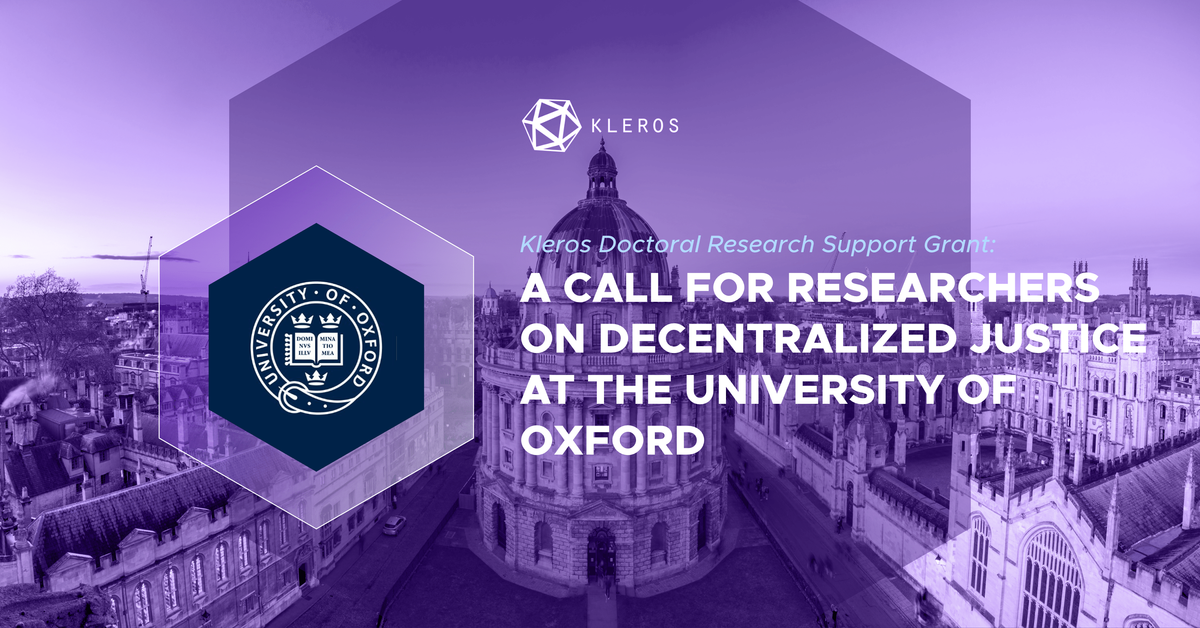The Kleros Doctoral Research Support Grant: Research Decentralized Justice at the University of Oxford!

The Kleros Doctoral Research Support Grant, a fully-funded doctorate in computer science at the University of Oxford…
We are happy to announce the launch of the Kleros Doctoral Research Support Grant, which will provide support to a PhD student researching decentralized justice at the Department of Computer Science at the University of Oxford.
The candidate will conduct their research under the supervision of Dr. Paul Goldberg, a highly regarded scholar specializing in game theory and machine learning.
This grant will support research that builds on our existing work on studying voting and incentive systems in Schelling-point-based systems such as Kleros.
The Research Topic
Many classical problems from social choice theory are present in Kleros: if voters are selecting between several different reasonable resolutions to a dispute, their votes may be divided between these options and a less acceptable option may obtain the most votes.
However, Schelling-point systems present an interesting twist on these questions. The incentives paid to jurors depend on whether they vote in agreement with other jurors. So a juror Alice is incentivized to think about how other jurors think Alice will think that the other jurors will vote, etc.
These effects combine with research on voting systems in interesting ways. A juror’s expectations for which options will win depend on how her expectations for other jurors’ votes are aggregated using a given voting system.
There are many interesting research questions here:
- One can model jurors as having a computationally bounded ability to reason about the multi-layered expectations of how other jurors will vote and how these expectations translate into collective outcomes via a voting rule. Then, one can ask what the most appropriate models for juror reasoning are and what they tell us about which voting and incentive systems are likely to produce good outcomes.
- To what degree can one choose voting and incentive systems that not only perform well on incentivizing jurors in Schelling-point-based systems but also have other desirable properties from social choice theory? For example, there are various properties one might want to minimize tactical voting situations or to handle vote splitting between similar outcomes. Social choice theory has shown that such properties are often incompatible with each other, so one must accept trade-offs based on which properties are important in a given application. This raises interesting questions about which properties are important and attainable in a Schelling-point-based system.
- How do all these questions interact with the presence of attackers? Blockchain environments are attack-rich, so if you want a system to be robust, you need to consider how its incentives hold up against bribes, malicious large whales, etc.
Information about the Program
- The project supports fees plus maintenance for any student who is eligible for home (UK) tuition fees at the University of Oxford. (Check this link to guidance on fee status and how to evaluate it.)
- Dates: To start in the 2024-25 academic year, funded for 3 years in total, full-time study.
- Entry requirements are discussed at the page on DPhil in Computer Science.
- Application deadline: There are 2 rounds of applications, with deadlines in early December 2024 and early March 2025.
- Candidates should apply for DPhil in Computer Science at Oxford via the standard route. In the application, they should specify Paul Goldberg as prospective supervisor, and mention the Decentralised Arbitration project. The link for applications is here.
For more information about the Kleros Doctoral Research Support Grant and the application process go to this website.
We are thrilled to be partnering with the University of Oxford in fostering the advancement of research on decentralized justice!
